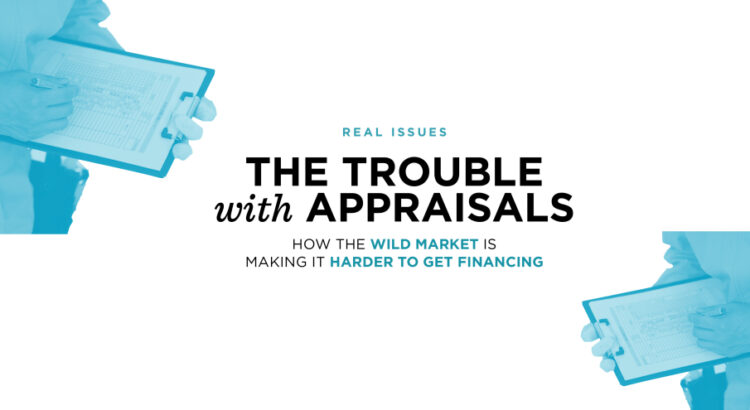Anyone paying the slightest bit of attention to the residential real estate market these days knows one thing: It’s hot.
With record-low inventories and rock bottom mortgage rates, every day seems to bring a new piece of data pointing to a market on the move. The fast pace of change is being seen nationwide, from Boise to Boston and Miami to Minneapolis.
The rate of change is so fast, in fact, that one crucial piece of the homebuying puzzle is frequently being left behind: the appraisal.
“The market’s so insane that properties aren’t appraising for the purchase prices,” said Carrie Dorn, a Chicago-area real estate agent at Compass and a certified real estate appraiser at D&H Appraisal Service Inc.
Homebuyers lucky enough to win a bidding war for a property are increasingly running headlong into appraisals that don’t match — or even come close to — the agreed sales price, leaving them with limited ways to close the sale.
This can leave parties to the deal — the buyer, the seller and their real estate agents and lenders— frustrated, to put it mildly.
“We’re running into appraisers not wanting to be flexible with the market,” said one Atlanta-area agent who asked to remain anonymous. “They’re wanting to stick to prices-previous, and the market’s a little bit different now. …Appraisers are going to have to be just a little bit more flexible, because the willingness to pay, the demand, is there. Appraisers like to set the prices themselves instead of the demand of the market.”
Such characterizations understandably raise the hackles of the appraisal community. Five appraisers from across the country who were interviewed by Chicago Agent Magazine all complained that their role in the homebuying process is often misunderstood, especially in these heady times.
“Other market participants may say that the appraiser is ‘killing the deal,’ but our first responsibility is to our client, which, virtually 100% of the time, is the bank or the mortgage company or the lending institution that hired us to provide an appraisal,” said Lincoln Appraisal & Settlement Services President and Chief Valuations Officer George Demopulos, who is also the immediate past president of the Massachusetts, Rhode Island and Maine chapter of the Appraisal Institute, an industry group.
“Many of the lenders that are very upset with appraisals today, they will also be the first ones to sue when the market declines,” said Robert Mesner, principal and real estate appraiser at Mesner Real Estate in Royal Palm Beach, Florida. “Appraisers don’t make markets. Appraisers determine from market data what markets are doing and apply it to the valuation of the properties.”
The primary piece of market data Mesner is referring to is the comparable, or “comp,” which is a recently sold property with characteristics similar to the subject property. Given the pace at which home prices are rising, a three-month-old comp can seem like ancient history.
“The question is, where do you get data? From closed sales,” Mesner said. “So, when the market is jumping at the rate that it is right now, closed sales are based on something that happened previously. Therein lies the issue.”
For Mariella Massa, an appraiser and the CEO of Houston-based FinHous, the frustration people feel when an appraisal doesn’t meet sales price is an opportunity to educate others on the appraisal process.
“It’s not just us waking up on the wrong side of the bed,” she said. “We’ve just got to follow these rules. I think a lot of Realtors are getting hip to the square.”
Taking your time adjustment
One tool appraisers do have available in a fluid market is the so-called time adjustment or mark-to-market, in which the value of a comparable property is adjusted by the rate of appreciation (or depreciation in a declining market).
Demopulos pointed to the Boston market, where big tech companies — Amazon, in particular — have flocked in recent years to capitalize on the intellectual power of recent graduates of Harvard, MIT and other schools, driving up real estate prices in the process.
“Time adjustments must be used by appraisers to reflect the market,” he said. “There’s some appraisers I see — I do review work — who aren’t making time adjustments, and that’s concerning because they’re not reading the market and analyzing the market.”
Dan Fries, president and chief appraiser of Atlanta-area Daniel Fries & Associates Inc., agreed.
“We all have the same comps,” he said. “It doesn’t matter that the cost of lumber’s gone up. What matters to the appraiser is, ‘Where can you hang your hat?’ And if we can show the market’s gone up X percent a month, you can apply that. They probably wouldn’t be yelling and screaming as much if everybody would do that.”
Appraisal wavering
Others involved in the home-sale process also have tools, the appraisal waiver, in particular. Under this agreement, the buyer makes up any difference between the appraisal and sales price. It can be indispensable in winning a bidding war in today’s market, and would-be buyers without enough liquidity are often priced out by cash-rich competitors.
“It’s not a traditional market, because only the buyers that have the extra cash are able to be successful in purchasing,” Dorn said.
In other words, cash is king.
“What’s happening is Mr. Triple-A Credit with a lot of money will go in there and say, ‘OK, I’ll make up the difference,’ and your [Veterans Affairs] person or first-time homebuyer is going to get squeezed out,” Fries said.
The pandemic’s work-from-home phenomenon is also making liquidity more important, as residents of expensive gateway cities, realizing they don’t need to come to the office every day to work, take their Park Avenue equity to Main Street, or Biscayne Boulevard, as it were.
“If you were in New York City, the market values compared to South Florida are off the charts,” Mesner said. “There are many buyers who are coming in with cash offers, and that means that the buyers with mortgages are at a disadvantage. If the prices are bid up beyond what the historical market data can support, that means that the buyer has to come up with additional cash.”
Calling all would-be sellers
Going forward, appraisers expect the disconnect between appraisals and sale prices to shake out — eventually.
“There’s a light at the end of the tunnel,” Fries said. “In the next 60 days, when all of this closes, hopefully we’ll have a new comp base and better comps to draw from.”
In the meantime, people who have long considered selling their split-level but didn’t want to put in the effort to prep it for sale might want to seize a rare opportunity.
“If I had that house on the busy street, or with the shag carpet, or didn’t feel like updating the kitchen, now is the time to sell,” Fries said. “People are going to take you, freckles and all.”


